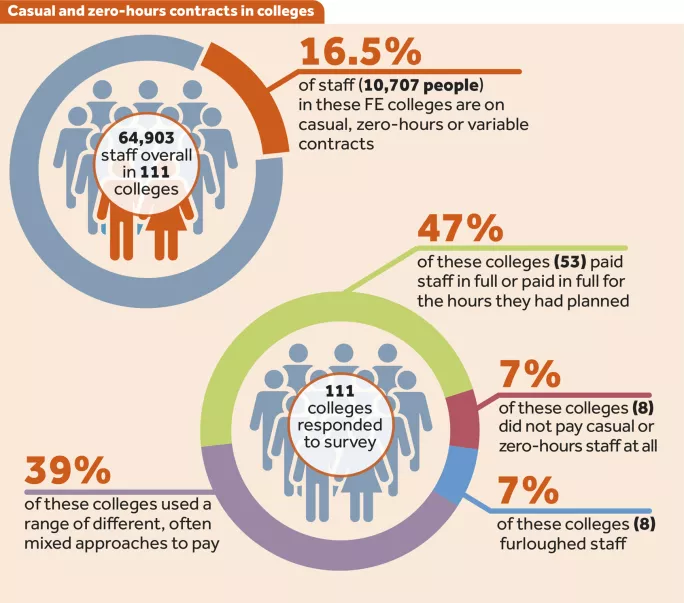- Home
- Revealed: The gap in casual staff pay during lockdown
Revealed: The gap in casual staff pay during lockdown

Fewer than half of colleges paid all their casual staff either in full or in full for the hours of work that had been planned during lockdown, exclusive data collated by Tes has revealed.
The survey showed the huge discrepancies in the pay that casual staff across FE received during lockdown. According to the data, 16.4 per cent of staff in those colleges were on casual, variable, or zero-hour contracts.
It found that across the over 100 colleges that responded, the difference in whether or not casual staff, or those on variable or zero-hours contracts, were paid when colleges were closed to the majority of students varied extensively.
Background: Support college staff on insecure contracts, say UCU
More: Casual FE staff struggling to make ends meet, research finds
Casual work in education: 'I even contemplated suicide'
Around 47 per cent of colleges either paid staff “in full”, or “in full for the hours they had originally planned” for the rest of the academic year, the freedom of information request revealed. However, 7.2 per cent of colleges did not pay casual or zero-hour contract staff at all. At a small number of institutions, staff were “in part”, while at 16 per cent colleges, pay varied depending on role: often, in this case, academic staff were paid in full for the hours they were able to work, whereas support staff received less pay than normal, or no pay at all.
Across other colleges, staff were paid for “average hours” or “average of 12 months' earnings”, while elsewhere, staff were furloughed on 80 per cent pay or on 100 per cent pay. Overall, 7.2 per cent made use of the furlough scheme.
Altogether, Tes found 18 different systems of pay in place across the 111 colleges that responded.

One functional skills tutor on a casual contract with an FE college in England – who asked to remain anonymous – told Tes that their pay had halved during lockdown, which had led them to sign up to universal credit, borrow money from family and friends and use food banks.
They said: “As students couldn’t sit exams and the centre-assessed grades took time to process, our bonus payments were affected.
“Student numbers have dropped and apprentices who were furloughed have now delayed their studies. Student numbers dropped and we’ve had fewer applications in general. I’ve had to claim Universal Credit and borrow from family and friends and use a food bank once as well.”
‘The injustice of casualised work’
The University and Colleges Union (UCU) published research in 2019 that found 72 per cent of staff working on insecure contracts in further, adult and prison education said they struggled to subsist, and 56 per cent said they experienced problems paying bills.
In March this year, UCU called for staff on casual contracts in FE colleges to receive guarantees that they would not lose any money in the event of cancelled classes caused by the spread of Covid-19. Unison also called for ministers to reassure “the staff who keep colleges running that they, too, will get financial support."
UCU general secretary Jo Grady said it was unfair for casualised staff to be treated differently during lockdown and called for colleges to end the “injustice of casualised work”.
She said: “We welcome the decision taken by most colleges, to pay casualised staff in full, or for the hours that they had planned to work, during lockdown. But it cannot be fair that casualised staff were treated differently according to the college that employed them, with some staff receiving nothing from their employer throughout lockdown.
“Our research shows that employing further education staff on casualised contracts damages morale and negatively impacts students, and Ofsted recognises that instability in teaching teams can be a barrier to the quality of provision. All colleges need to end the injustice of casualised work and invest in a stable permanent workforce to further improve student learning.”
Unison national officer for further education Leigh Powell said: "It's immoral to use the pandemic as an excuse to put staff in severe financial difficulties.
"These workers should be paid the wage they'd get if they were working. Colleges should also recognise their value by providing them with the same opportunities and support as staff on permanent contracts."
Mary Vine-Morris, Association of Colleges national lead for employment and area director for London said: “Colleges have worked really hard to minimise the impact of the pandemic on all staff – including those on casual or hourly contracts. Clearly, from the research, the vast majority were anxious to make sure these staff suffered minimal financial detriment; colleges wanted to keep them engaged and motivated as they are a valuable asset and a key resource for future delivery.
“However, like many businesses, they have faced incredibly difficult financial situations with huge drops in income for some. Furloughing staff was a key way of protecting staff from redundancy across almost all sectors, not just colleges. As we move into the next phase of recovery and the reopening of institutions, all staff will play a key role in welcoming both new and returning students to a safe and dynamic environment.”
Keep reading for just £1 per month
You've reached your limit of free articles this month. Subscribe for £1 per month for three months and get:
- Unlimited access to all Tes magazine content
- Exclusive subscriber-only stories
- Award-winning email newsletters



